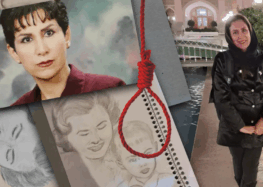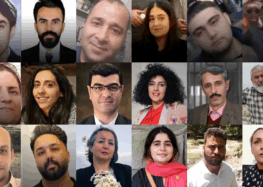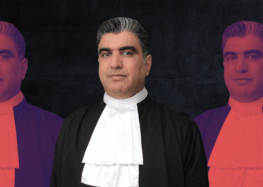Recently Released Detainee’s Account
A detainee, arrested by Iranian forces in the recent protests, relates:
“They inspected us in filthy, unsanitary situations.”
Susan Mohammadkhani Ghiasvand
The results announced from the tenth presidential election created a wave of protests across the country. These protests, carried out peacefully, faced the strongest possible crackdown by the government. Yet the exact number of those killed, injured, and arrested in the recent events is not available, due to falsified information, a lack of transparency, and restriction or closing of regular avenues of communication by the censorship of newspapers, the Internet, cell phones, and critical news websites.
According to some reports received within the past two weeks, security officials have arrested and imprisoned more than 250 political activists, university professors, journalists, students and human rights defenders who have been protesting the election results. There is no exact estimate for number of ordinary citizens who have been arrested and detained in the course of the peaceful demonstrations across the country. However, according to the available evidence, more than 2,000 people remain in detention. However, as a result of restrictions on the activities of independent journalists and the expulsion of international journalists from Iran, the accurate number of people who were killed by security forces, or Basij paramilitary forces, is not available.
Mass detentions are taking place without legal permits or the presentation of charges. Amongst the detainees are people who have no relation to the recent protests and were detained simply because of their presence in the streets.
I interviewed a detainee who was released a few days ago on a one hundred million Toman bail (which equals approximately 100,000 US dollars). She is a member of the One Million Signature Campaign and Karroubi’s Presidential Election Campaign Office.
Regarding her detention and its aftermath, she said:
“On Saturday, June 19th, I went to purchase a book from Jangal Publishing. On the same day, the supporters of Karroubi and Mousavi marched from Enqela Circle to Azadi Circle at 4 p.m. This demonstration was held the day after the Friday prayers and sermon of Ayatollah Khamenei. I reached the publishing house at 1 p.m., three hours before the beginning of the march. As soon as I got out of the taxi and turned to pay the driver, I was handcuffed and apprehended. Those who arrested me knew that I am a member of the One Million Signature Campaign and Karroubi’s Election Campaign Office.
I was taken to the Vozara detention center (located on the southern corner of Argantin Circle), which is for the temporary detention of prostitutes and drug addicts. These days, due to the increase in number of detainees, those arrested are taken to Vozara, Shapour, security police detention centers in Nilufar, or behind the Revolutionary Prosecutor’s Office and Kahrizak camp detention centers. At the Vozara detention center I was inspected. The behavior of the inspectors was highly offensive and humiliating. The inspection was performed in a very dirty and insanitary manner. They [the inspectors] would insert their fingers into all of our body orifices without gloves. They do this with prostitutes and addicts to find drugs. However in our case they were trying to find cell phone memory chips.
I was kept in the Vozara center that night. I was not allowed to contact my family. My cell phone was also confiscated there. The next night, at 2:30 a.m., I was moved to Evin Prison. If we were lucky and freed from the detention center, we would not have a criminal record, but whoever was moved to Evin would be considered a criminal and they would file a record on him or her.
During the interrogation we wore blindfolds and sat on a chair facing the wall. Each two of us were questioned by one interrogator. We could overhear others being interrogated, and our phone conversations from jail with our family were overheard and used against us during the interrogations.
In Evin Prison I was in kept in solitary confinement for two days. In solitary confinement there was a toilet and a shower above the toilet. The inside of the bathroom was visible from the outside, as its walls were only knee-high. The cell was outfitted with four cameras – one at each corner. This meant that when I used the toilet and shower, everything could be seen. In the lockdown, the air was extremely hot and those like me who have asthma underwent hardships. The food was repulsive and full of camphor, and after eating that food we were left with severe stomach problems.
After two days I was moved – along with many other detained women – to the “methadone patient” section of the women’s jail. The lack of space was so profound that a large number of women, recently moved to this section, were kept in the corridors of this section with only a blanket. The corridors were extremely dirty and unsanitary and an unsuitable environment for detained women. There was even a shortage of blankets so that I myself was sleeping on the bare floor. Due to the large number of detainees, even the prison officials were objecting. After the recent mass detentions, only one section of the Evin Prison was allocated for female detainees, and the lack of space in the women’s section imposed pressure on the prisoners as well.
In that section of the prison, the food quality was the same as in solitary confinement (lockdown). After each meal all were suffering intensely from nausea – and of course eating had another consequence: I do not know what they were putting in the food, but after eating everybody would feel stolid and drained, with an intense need to sleep.
No one would receive appropriate medicines. There was one lady who had breast cancer. She needed a special drug and before imprisonment she was under a doctor’s care. But in prison if she had severe pain they would give her – at most – a pain killer which had no effect. For her disease, she needed special medicine which is very expensive, and unfortunately they never provided it for her.
There was also an art student named _______..This poor person had multiple sclerosis. Warm weather is extremely harmful for this disease. There, the air was very hot and she was feeling severe pain and discomfort. There were many people who experienced pain and nausea because of the food. After a lot of screaming and complaining, one might get a pain killer, or if the detainees were taken to a clinic, at most they would be injected with a serum or receive a nausea pill.
_________, a theater actress, was also amongst the detainees. She told us that she merely went to the place where Neda was shot to light a candle and she got arrested there. I did not know about Neda. She explained what was going on outside and then I understood what had actually happened.
Two student activists namely ____ from Alameh University and ______ from Amir Kabir University, were there. They were supposed to be freed on bail. However since they did not respond to the question of whether they had a record, the interrogator took note of their hesitation and they were taken to solitary confinement, where both of them are under extreme pressure.
Amongst the detainees there were 23 ordinary pedestrians. One of them was arrested after buying bread and they took her with the same fresh bread to prison. Even though she had tried to tell them that she was only out to buy bread, no one believed her and they responded by asking her whether she thought they were fools. “You come for the march,” she was told, “and when it becomes unruly, you stand in the bakery line and pretend that you came out only to buy bread.”
Amongst those who were arrested were three students, between fifteen and sixteen years old. One of them was arrested along her mother and aunt, while two others were detained for cycling up Motahari Street. The interrogators were harassing the teenagers very intensely. At one point, they were telling the teenagers that the lockdown cells were haunted and they would be imprisoned there. As a result, the children were afraid and were crying loudly. Those children were kept in detainment for twelve days.
There was a woman amongst us who was coming from the Robat Karim Family Court to Enqelab. She went there to divorce her husband on the same day. They arrested her in the bus and charged her with going to Enqelab to participate in the march.
From these anecdotes I would like to emphasize that the mass detention is so blind that the detainers paid no heed to whether those detained actually took part in the march and were protesters or not. They arrested people merely for their presence in the streets, and this is a common practice that seems to be continued.
In the jail, interrogators were checking weblogs, websites and Facebooks. We also had to give our e-mail account information. They were checking our e-mails. Also all of our cell phone contacts were tracked down, and they kept our cell phones on in order to receive the phone calls and then question us about our relation with each caller and the reason why the person had called.
The number of those who were arrested in the Saturday Laleh Park rally was over 60 on the last night I spent in prison, and they moved them all from Shapour Detention Center to Evin Prison. The time that authorities free detainees is from 7 p.m. to 11 p.m. They free 5 women for each 100 men, and that is due to the large number of men imprisoned. On the last day of my detention, I wrote a petition and the other prisoners signed it. In that letter I asked the prison authorities to consider our clothing and health situation and to provide facilities to contact our families. After turning the letter in, a person called Mr. Yari came to us. When he heard of our needs and entreaties, he momentarily brought a TV, a newspaper, and a phone. He bought phone cards for us at his own expense. The quality of water is very low in Evin, and Mr. Yari bought us mineral water. He provided underwear for everyone. On that day I wrote the letter at 2 p.m. and I was freed at 10:30 p.m. on a one-hundred million toman (100,000 US Dollar) bail. I was really surprised by Mr. Yari’s behavior. I do not know if this attitude was continued afterward or not.
The authorities still did not give my cell phone back. I have gone back there over the last few days to ask for it, but they do not give a proper answer. They still keep my phone on to find out who is calling, who is in touch with me.






